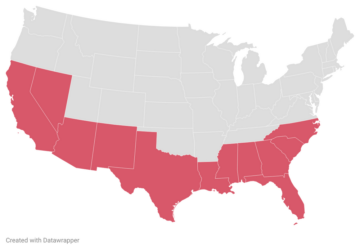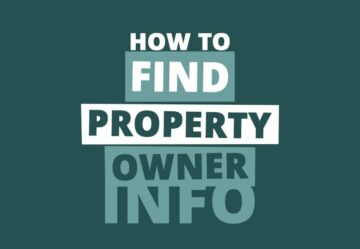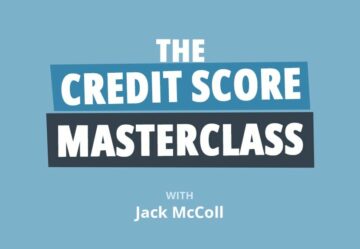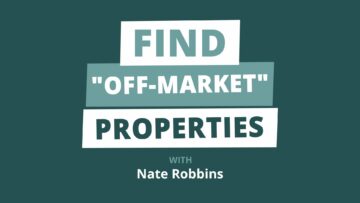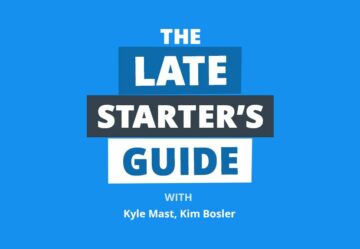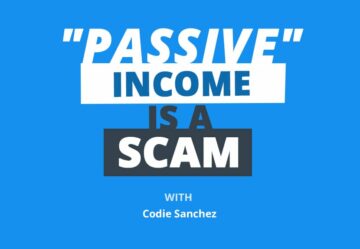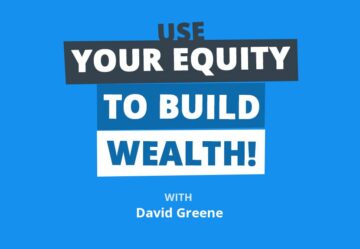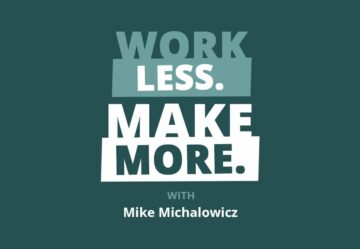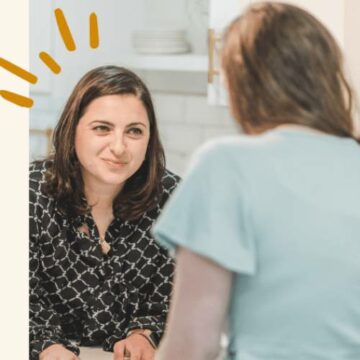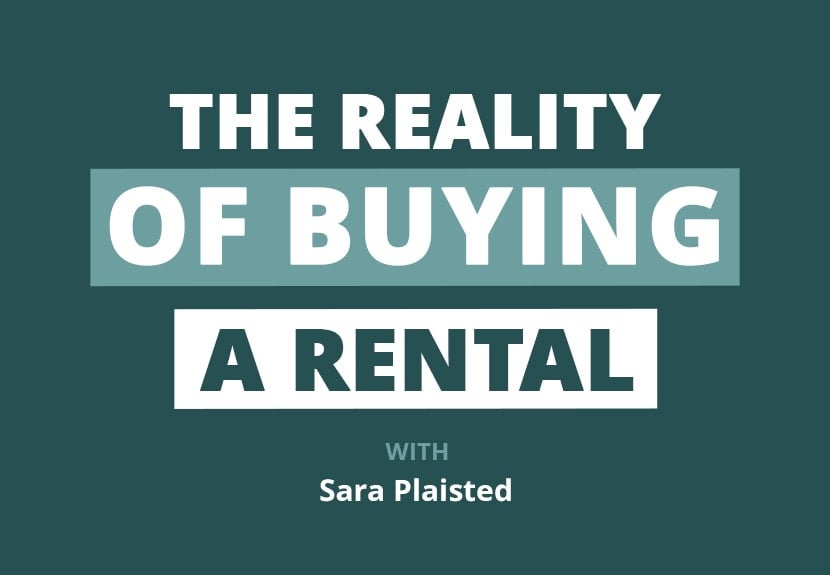
You don’t need to look very far to find a real estate success story, but it’s not every day that you hear from someone who is currently in the trenches of their very first real estate investment. The truth is that there are all types of hurdles to overcome during an investing journey, and today, you’re going to hear from someone who is still in the thick of it.
For years, interior designer Sara Plaisted dreamed of investing in real estate. But like many real estate rookies, analysis paralysis prevented her from taking action. Having built up a network of people to lean on, however, Sara eventually drummed up the courage to dive in. It wasn’t long before she landed her very first property—a two-story cabin tucked away in four-seasons vacation spot Julian, California. Unfortunately, the story doesn’t end there. Rather than enjoying consistent cash flow and great tenants, Sara was dealt a steep learning curve that involved persistent water leaks, excessive rehab costs, and other issues.
If you’re struggling at any point in your real estate journey, you’ll want to tune in to this episode and hear Sara’s story. She shares about her initial fears surrounding real estate, how she was able to land her first deal, and how she is currently dealing with all of the unexpected hurdles that her new property has thrown her way!
Click here to listen on Apple Podcasts.
Listen to the Podcast Here
Read the Transcript Here
Ashley:
This is the Real Estate Rookie Podcast, episode 277.
Tony:
You’ve learned so much on this first deal, Sarah, that I’m sure if we talk to Sarah today versus Sarah six months ago, you’re two totally different people when it comes to your knowledge of real estate investing. Even if you’re able to walk away from this deal eventually down the road at a breakeven, it’s still the multiple, the return on that is 10x, 100x because you’ve been able to learn and give yourself the tools you need to keep growing.
Sarah:
Thank you. I knew that this was just going to, hopefully it’d be just growing in equity and break even for a few years. That’s fine. It’s the digging myself into a hole right now, it’s just what’s-
Ashley:
My name is Ashley Kehr and I’m here with my co-host Tony Robinson.
Tony:
And welcome to the Real Estate Rookie Podcast, where every week, twice a week, we bring you the inspiration, motivation, and stories you need to hear to kickstart your investing journey. Today, I want to give a shout-out to someone who goes by the name of Andrew. Andrew left us a five-star review on Apple Podcasts. His review reads, “Great host, amazing company, unforgettable information, BiggerPockets is one of the most altruistic companies I know. They provide so much value free of charge, and this podcast does not disappoint. Very knowledgeable guests and amazing host. Definitely worth checking out.”
If you haven’t yet, if you’re a part of the rookie community and you have not yet left an honest rating and review in whatever platform it is you’re listening to, please take the few minutes takes to do that. The more reviews we get, the more folks we can reach, and the more folks we reach, more folks we can help. That’s what we love doing here. I feel like we’ve been getting a string of really positive reviews as of late, Ashley, and it really helps my super tiny ego, my super sensitive ego when I hear all this positive feedback.
Ashley:
Sarah is a special guest today because I did a giveaway on the pre-order that when someone pre-ordered the book Real Estate Rookie: 90 Days to Your First Investment, one person would get to come on the show with me and Tony and we’d get to interview them, but also they could ask us some questions and how we can really help them on their journey. Sarah is completely honest that she bawled her eyes out yesterday and things are not going as she expected with the rehab of the property. We kind of go through what she has accomplished. She was stuck in analysis paralysis for a couple years, finally took action, and we talk about what that action is and how she found that momentum, and now that she’s into the property, something that has come up and how she’s going to work through it and overcome it.
Tony:
There’s one part of the episode where she gets super vulnerable and really just, we go into kind of a deep conversation about the challenges that come along with being a real estate investor. I’m so appreciative that she opened up to us in that way because I think it sheds a light on the part of real estate investing that doesn’t get talked about enough, and that’s the challenges and the doubt and the fear and how do you work through that. We spend, I think, a decent part of the episode just reframing those challenges that she’s going through and positioning them in a way that actually supports Sarah and her long-term goals of building wealth through real estate.
Ashley:
When Sarah first found out that she was the winner, she won this, she declined it actually. She said, “No, I don’t. I just got my first property under contract. I haven’t really done any real estate investing yet. I don’t think this is really for me.”
And so, I had someone email her back and say, just, “You are perfect. You’re in it right now.” We love how this podcast episode came out because she is literally in the nitty-gritty right now, and somebody who maybe did this a year ago or two years ago. There’s things that they’re not going to remember, things they’re going to forget as they’re telling their story, so I think listening to how this is impacting her right now, it can motivate you and inspire you, but also it can show you what some risks are.
Take a listen to today’s episode and take it with a grain of salt is that it’s not always going to be picture perfect. There’s not always going to be this huge win at the end, or maybe there still will be for her. We just don’t know yet. That was why I thought it was so intriguing and interesting to listen to somebody who’s kind of in the trenches of it right now on their first ever deal. Sarah, thank you for purchasing the Real Estate Rookie book too.
Sarah:
Oh, you know it.
Ashley:
I appreciate it.
Sarah:
I got it. I thought it was spam that I won this. I almost deleted it.
Ashley:
Well, we’re super happy to have you here. Tell us about before even real estate as to who you are and maybe what brought you to find real estate investing.
Sarah:
I’m an interior designer in San Diego, and about five years ago I started casually looking into real estate investment just for fun, looking at places I like to visit, and learning about money management and personal finance and mindset and figuring out how I could do it. I didn’t really know, I didn’t have any tools at the time, so I just look at expanders and people who have done it before and how I can do it. Three years ago, I found you guys and just gobbled up as much information as I could. I was buying all the books and watching the podcasts and YouTube and really trying to get as much information and catch up as I could.
Couple years after that, I started realizing I got some analysis paralysis going on here trying to be perfect and get everything and have this fear of failure. It was this mindset balance that I was trying to go through a lot and I watched a couple friends buy properties, and that really motivated me and lit a fire under me to like, okay, let’s get serious. Let’s start making some offers and take some action steps. I was meeting with realtors that I met through BiggerPockets and brokers and getting my spreadsheet lined and my cash flow, figuring out what I could do and what my strategy was. If one strategy didn’t work, I’d pivot and go over to another direction and explore that for a little bit and go over here.
About a year ago, I got serious and ended up, I put one offer in and got outbid by $5,000, but that was good practice. But again, then I pivoted to a different location that had a little bit less competition and it was closer to where I live, and the market started to change and I just kept the big picture perspective and thinking, okay, maybe this is less competition for me, and even though the interest rates are higher, I can re-file later and just made it work with what I had, and then made an offer a week after it was listed and it got accepted.
Tony:
Man, congrats.
Ashley:
I want to touch on real quick, one thing that you said that was really important, and you talked about the analysis paralysis. Then you said you got to the point where it’s like, okay, I have to take action. Right after that, you said you started making the offers, and that right there is just such a huge thing where people don’t even make the offers, they never even make it to that step as to feeling comfortable to putting offers in. Why do you think that you decided to make offers? What are some of the things that made you feel comfortable and confident that you’re ready to put those offers in whether they’re accepted or not?
Sarah:
It was scary, but I had seen a lot of places that I wasn’t really sold on and this one fit and I thought it was manageable and it fit in the cash flow for living in it for a year for me, and then doing a short-term rental after, so just running the numbers constantly. It did feel like a little bit of a stretch at the time. Being in California is a bigger investment for what you get.
Tony:
Congratulations, Sarah, on just taking that action because I think so many people get stuck at that phase, so the fact that you’re able to push through that I think is super impressive. But something else you mentioned outside of the analysis paralysis was the fact that you saw other people in your network who were taking that step, and that was part of what gave you the confidence to do it yourself. I think that’s such an important thing to call out, because for a lot of our rookie listeners, they’re on this island by themselves. They’re binge-watching or binge-listening to the podcast and they’re binge-watching the YouTube channel and they’re reading all the books, but then they look to their left and they look to their right, and they’re the only person that’s doing this in their current circle.
That’s why we stress so much, Ash and I, the importance of building your network so that there are other people around you who are going through that same journey. Whether it’s the BiggerPockets forums, the Real Estate Rookie Facebook group, joining some of the BiggerPockets boot camps, or other coaching programs, whatever you can do to surround yourself with people, that gives you the confidence to say, “Well, man, if Ashley and Tony can do it, I’m just as smart as those guys are, I’m sure I can do it too.” I love hearing that.
I want to talk a little bit more about your buy box, because you talked about shifting markets. You mentioned that before we started recording, that you live in San Diego, California, which is a pretty expensive market for most folks. I guess two questions, a, why not invest in your backyard? Was it just the price point or was it something else? Then, B, how did you solidify, okay, this is the type of market that I’m looking for because the country’s a big place. How did you narrow it down in one specific city?
Sarah:
I wanted to be local, and I felt like that was more manageable for me. But at the time when I was looking around San Diego, I thought, okay, maybe I can get a duplex and BRRRR it with an FHA, but I had my parents cosign with me, so that threw a little wrench in to the buy box. Then, I was just pivoting around condos. I only had about a $500,000, that was pushing it at the time too, limit. I had to make sure that I could cover the mortgage and how I would do that. It started to feel out-priced in my backyard for me. Then, I just went out to a vacation spot an hour and a half away that I love to visit and feels good. You get out of the city, it’ll draw people out to just regroup and get grounded and escape rough reality. It’s fun.
Tony:
Are you in Julian, California? I assume that’s the closest vacation spot to San Diego. Can you just describe what Julian is for folks that aren’t familiar with SoCal?
Sarah:
Julian is I think one of the only places around SoCal that’s four seasons. Right now, we’ve been hit with a lot of snow and a lot of rain, but then we’ll have super blooms in the spring and then a pretty dry summer, kind of like the desert about 95 degrees, and then goes into a beautiful fall where all the leaves change and it’s pumpkin picking and apple picking. It’s really family-oriented. There’s hiking, there’s a dark sky network.
Tony:
Sarah, I love, and I’m kind of leading because I wanted to follow up with this is that the majority of our listeners probably have never heard of Julian, California. Even for me, I’m an hour and a half north of you, and I never really heard of Julian either until I started knowing people in San Diego. But for people that are in south of where I’m at, everyone knows Julian. The reason I’m bringing this up is that every pocket of the country, every state has its own local regional spot where it’s like, “Hey, yeah, if I want to go to the snow, this is where we go.” Or, “Hey, if I want to go to the river, this is where I go.” Or, “Hey, if I want to go to the lake, this is where… If I want to go mountain biking…”
Every state has its own little area that caters to that traveler. And so, many people ask me, Tony, how do I find the right market? How do I know where to invest? Really, I say, it doesn’t really matter. You could pick any state. You could drop a pin on any map in any of the states in the United States, and you’re going to find at least one market that makes sense. The fact that Julian works for you I think is an important thing for us to call out to the listeners.
Sarah:
I heard somebody say that they put a pin where they live and they went out about an hour and then just went around a radius and like, “What’s manageable for me, Mexico, the ocean? Okay, over here.”
Ashley:
Sarah, what’s kind of the plans with this cabin then, this property? Can you tell us a little more about it?
Sarah:
One of the selling points was it was a two plus one upstairs and a studio downstairs. Having those two incomes eventually really helped the cash flow and made the price point worth it for me, and it just evenly balanced. As soon as I move out, then I hope to get a long-term renter in there just because I’ve listened to the communities where everyone’s investing and I want to provide some kind of local housing for people as well as using part of it for a vacation spot for people and create that balance.
Tony:
You’ve got the 2-1 upstairs, a studio downstairs. You’re currently living in the property, correct? Then, the plan is to rehab or how are you-
Sarah:
Yeah, I got a rehab. It’s more than I thought. There were a couple issues. There was an active leak when I put the offer in and they were dealing with their insurance. I was under the impression that everything would get fixed as they were going through and get the insurance to clear off. Then, they whittled it down to the cause of the leak being these upstairs doors upstairs on the patio and the basement studio is below it.
Ashley:
Oh, so it was coming in through the doors like the doors weren’t sealed and then coming down as a unit.
Sarah:
Well, Whoever put these doors in, wood doors without an overhang, so the wind and the water and snow just seeped in. They give me credit to replace the doors, got the property, ordered the doors, have them ready to be installed, and there’s still a leak. There’s so much water on the mountain, it’s just soaking wet. On my first day I got the keys, I shoveled two feet of snow off that 20-foot patio with a huge heavy shovel and was just… over them. Really, it was a mountain welcoming to me.
Tony:
That’s got to be one of the best welcome to real estate investing stories that I’ve heard on this podcast in a while. Like the day that you close, you have to shovel two feet of snow. That’s awesome.
Ashley:
Especially when you live in San Diego. For me, that’s normal to go to a property to do that.
Sarah:
No, I don’t do snow, really. Last time I was in Telluride for a friend’s wedding and I fell. Anyway, so it’s a learning curve and it’s fine, but it’s just now in the discovery phase of other things that I’m starting to need to put some more focus on and pivot my budget.
Ashley:
Are you having to remodel both units?
Sarah:
I was only planning on the upstairs. That would be like, because that’s the cabin vibe, it’s got the wood ceilings and the beautiful fireplace and really cozy.
Tony:
Just really quickly, Ashley, I just want to pick your brain. Obviously, Sarah, this is your first investment. Every time we buy a property, we learn something new. For me, I feel like, and it depends on the property, but I often try and get the seller to repair depending on what our goal is, but to repair certain things. If it’s something like aesthetic demos, I know I’m going to change that stuff myself anyway, so I’m not going to ask the seller to put a new flooring or redesign the bathrooms.
But for example, we just bought a property and we had the seller replace the septic tank because we knew that the septic tank was bad and it could’ve been on us. He just would’ve given us a credit to go out there and have it done ourselves post closing or to have the seller do it. We push really hard to have the seller repair it because there is that unknown of, okay, what if it’s more than the septic? What happens after that? Ashley, I’m just curious, when you’re buying deals, how do you determine what you’re going to solve and fix versus what you want to push towards the seller?
Ashley:
All of my properties are pretty much as is. They are so bad that you can’t even pick and choose for me to say, “I want this fix.” It’s just, come on Ash, look at this property. That’s not going to do anything to improve it. I never asked for anything to be done. Maybe if I started to focus more on things that weren’t as big of rehab projects, maybe I would ask for things, but I’m putting in my offers knowing that I’m going to have to be doing a lot of work and a lot of different things. The probably one thing I would ask for though is the septic and the well to be done. I think that is a great example.
When I flipped a house in Seattle, Washington, we purchased the property with no inspection, but we did ask for a sewer scope because in Washington, or at least in Seattle, if there’s some law or regulation where if the sewer line needs to be fixed to your house, if you are the new owner taking it over, you’re not grandfathered into some kind of thing or whatever. But if you are the current owner of the property and you go and make that repair that it’s a lot cheaper because you don’t have to do something, I don’t remember exactly what the law was. That was something the person I was partnering with, they always asked if there was something wrong with that sewer line connecting to the main. They would always ask for the seller to make that repair, even if they had to add on to the purchase price to cover the cost of it because it was so much cheaper to have the current owner purchase the property or repair that thing than to have you, as a new owner, do that.
Tony:
Cool. Awesome, Sarah. Obviously, that first deal is where you’re going to learn a ton, so I’m glad that we’re getting some good learning lessons from this one. I wanted to circle back quickly to the numbers on this deal. If you wouldn’t mind just walk us through what your purchase price was, what your total cash to close, and what you’re projecting for the rehab costs.
Sarah:
It was $500,000 and I did 5% down. Here’s where I messed up on my numbers. I only allocated 1.5% for closing costs when I should have probably put 3% down. I had spoken to probably four different lenders.
Ashley:
Why was that, Sarah? Was there something else that came up in your closing costs that made it double?
Tony:
Because I’m in California too, and I usually budget about 2% for our closing costs.
Sarah:
I don’t think I knew to pay a year in advance for insurance, and then four months for property tax or whatever that was. But what was good is I got a $9,500 credit from the seller that went right into closing costs, so it made it really even. After the inspection report, which raised some eyebrows, I called in a contractor to do a walk just to see, is this thing going to fall off the hill? Is this worth it? Am I going into a money pit? He’s like, “No, but there are some fixes that you’re going to want to do, and you could probably do it for $30,000. Then, furniture would be on top of that.” That’s what I broke down and I was constantly going back to these numbers, like each part that needed to be upgraded, what that cost would be, and then it made sense, but now that I’m in it.
Ashley:
Did you have an actual inspector come or you just used the contractor? You had both the inspection report and then the contractor. I think that’s a great mix to do if you can do both of those to get two different points of view. At this time, were there things that were different that the inspector said that should be done that maybe the contractor didn’t or anything like that?
Sarah:
A lot of the leak was pointed again to these French doors on the patio. They voluntarily put in a French drain behind the house at their cost of $11,000 to keep the water going away from the house. When I got in there, water was still coming underneath the house in that location. It could be the water heater, it could just be water coming from who knows what direction. I don’t know, but it makes me wonder because they didn’t disclose any subterranean water intrusion, why did they voluntarily put in an $11,000 French drain that wasn’t really done properly? It wasn’t down as deep as it needs to go either. It’s getting one plumber in, it’s just like, “Sell it immediately,” and one guy says, “Okay, let’s figure out what we can do to just keep moving along and take it in stages,” but it’s been overwhelming.
Tony:
One question I just want to ask because you kind of glossed over this, but as a first time investor, you were able to find a contractor to come walk your property with you, which is a challenge for so many new investors is finding the right contractor-
Ashley:
Even the experienced investors get someone to come.
Tony:
It’s good to get someone to actually show up. Can you walk us through, Sarah, how you found that person and what they charged you, if anything, to do that walkthrough with you?
Sarah:
Yeah, thank you for asking because when I pivoted over to Julian, I really wanted to use a local realtor, and she has been invaluable because she’s had bread and breakfast two or three different spots since the ’90s, so she knows people, she knows all the subs, she knows the best contractors. It was her high reference of a really good local contractor. He came out, I paid him $350, and then he gave me a report of here are things to address. Then, on the side he told me the estimate of what it would probably run, which is about $30,000. I know, I come from interior design and construction, I know those numbers just get out of hand. Part of me is just kicking myself for being naive or I don’t know.
Ashley:
What would you have done differently in that situation looking back now?
Sarah:
Yesterday, I was wishing that I was having buyer’s remorse and a lot of regret, and that was in the morning when that one plumber said, “I’ve dealt with people who just throw money into this situation and spend $70,000 and it’s just like you’re chasing your own tail.” But then, I talked to three other people later that day and I ended up talking to one guy who was trying to find the positive in the situation, say, “Look, let’s handle these three things. Let’s get the flood under control and get a wall up there and start to finish up the upstairs.”
Tony:
I just want to pause on this for a second because first, Sarah, I totally appreciate the transparency and the vulnerability here on the show, because these are things that so many of us struggle with as investors is like, “Man, am I making the right decision. Am I going down the right path? Did I just royally mess up?” These are all things that we struggle with at times. Just first know that you’re not alone. Let me ask this question first. How much cash flow annually were you anticipating to make on this first deal?
Sarah:
Upstairs, it’s probably only 52 because ballpark for the upstairs was like 250 a night at 50% occupancy, usually Thursday to Monday, it’s not as much as Joshua Tree area. That was just cutting it close a little bit with the long-term renter eventually, I thought that would be something stable, but when I move out and fix the downstairs, I got to short-term rental the downstairs just to recoup some money and have some pause, just have some pause down there that I have some days to come in and fix things if something’s going on.
Tony:
Here’s the reason I ask that question, because even if you’re able to break even on this first deal, even if you’re able to break even, in my mind, it still achieves its purpose because Ashley didn’t retire off of her first deal. I didn’t retire off of my first deal. David Greene didn’t retire off of his first deal. Beardy Brandon didn’t retire off of his first deal. Rob… I haven’t met a single person that did one deal and they were just like, “I’m done. I’m riding off into the sunset.”
The purpose of the first deal is to educate yourself. The purpose of the first deal is to give you the foundation and to give you the structure, to give you the confidence so you can go out and get your second deal and then your third deal and then your fifth deal, and then your 10th deal. You’ve learned so much on this first deal, Sarah, that I’m sure if we talk to Sarah today versus Sarah six months ago, you’re two totally different people when it comes to your knowledge of real estate investing. Even if you’re able to walk away from this deal, eventually down the road at a breakeven, it’s still the multiple, the return on that is 10x, 100x because you’ve been able to learn and give yourself the tools you need to keep growing.
Sarah:
Thank you. I knew that this was just going to, hopefully it’d be just growing in equity and break even for a few years. That’s fine. It’s the digging myself into a hole right now, it’s just what’s-
Ashley:
Well, I think too, you talked to that first plumber and he was like, “Sell it, get rid of it.” But you went and you talked to other people. There are people that would’ve just given up right then and there and just like, “It’s over. I need to list it. I need to basically give it away. I’m going to lose $50,000 on it, sell it for less than what I got it for.” But instead, that same day, you talked to other people, and I think that is such a major takeaway is don’t always rely on one opinion, one person that you went and you had other plumbers come and look at it. The fact that one of them was saying, “Let’s tackle these things first. Let’s get into it and take it steps by steps,” where maybe it’s more like taking it in these little parcels, these little segments can break it down for you and build out a plan.
And just like doing a full rehab, you want to have a plan in place, where myself, and I’m sure Tony too, where we have both done rehab projects where it’s like, “Okay, let’s just get it started. Let’s wing it.” But really, the best ones go where you have that plan in place, and I think that you’ve found a contractor that knows that too, where he can help you, let’s take it step by step and try to mitigate the damage. One thing that we have done is look at an issue and to see, okay, where’s something that we can, not even stop the bleeding, but slow the bleeding, so slow down the water that’s coming in and then work on actually stopping it. Then, what’s the actual solution to solving this complete problem so that it doesn’t happen again? That may take a little bit of time, but if you can keep working on the upstairs, because there’s no water coming into the basement, is there?
Sarah:
It’s in the basement.
Ashley:
I’m sorry, the upper one?
Sarah:
No, there’s no water coming in to the upstairs. It’s only the downstairs basement and it’s either the water heater, a subterranean, or maybe a leak from the patio into the storage unit next door.
Ashley:
I think part of it too is that you can still continue to work on getting that short-term rental operational, so then you have that income coming in to kind of offset some of these rehab costs that you may need to do to get that basement unit finished.
Sarah:
Exactly, and just wait for it to dry up next month. We have a couple rains coming in again. The good thing is that I came in knowing what this problem was going to be if. I would’ve bought it in the summer when it was dry and then this came and out of the blue, I would’ve been rocked, at least it was like got thrown in the deep end right away.
Tony:
Sarah, and there’s a reason I’m asking this question, but what are your long-term goals? Are you hustling to replace your income from your interior design business as fast as possible so you can exit that? Is real estate more of a long-term play where you’re looking to supplement your retirement? Help us understand the context of why you got started.
Sarah:
I will still work. I love doing interior design, but this is definitely a retirement goal. It’s figuring out how to diversify my assets and I’m in my 40s, I’m single, and I’m looking forward to what am I going to do for some stability in 25 years and collecting a portfolio that I can eventually have as passive income would be good, and some stability for me, I’d like to have my own home, but San Diego is… During COVID, it just got out of control. Everybody moved here.
Tony:
The reason why I ask about your goals, Sarah, is because I think that helps align or frame this first deal in an even better perspective because you don’t need this deal to work out today for you to feel financially stable. I think what you need to start asking yourself is, does this deal still make sense 5 years from now or 10 years from now or 15 years from now? Just the fact that you bought in a Southern California market, that by itself, assuming history continues the same trend it’s been on, it’s going to appreciate over the next 5, 10, 15 years. Even if you just hold onto this and it’s just break even for those 10 years and it’s just paying for itself, you’ve got an asset that’s wildly appreciated over that same timeframe, now you can refinance and now you can sell it and you’ve got so many different weights to happen to that equity. There are lots of ways to frame this, Sarah, where even though it seems scary in the moment, I still do think that there’s a lot of upside for you.
Sarah:
That’s what the contractor told me because I was looking at him, I’m like, “Am I buying a money pit? Tell me straight up.” He’s like, “No, get yourself in the market. Get your foot in the door and then just deal with it as it goes.” He’s like, “Look, this house has been here, it’s lasted this long. All of us are up here on the mountain.”
Ashley:
Well, Sarah, we really appreciate your honesty and also sharing what your experience has been like. There is nothing better than hearing someone’s story as they’re going through it instead of years later where if you were telling this same scenario two, three years from now, I bet there’s a lot of that that you would just forget about. It’s like childbirth. You have that first child and you’re like, “I’m never doing it again. That was so painful. That was awful.” Then, a year later like, “Oh, the baby fever.” It’s like, “Oh, that wasn’t so bad. I’m going to do it again.”
Tony:
I can totally relate to that feeling.
Sarah:
I might get a partner next time. I’m going to get a partner next time so everyone can have some [inaudible 00:32:31].
Ashley:
Was my first deal was with a partner because I was scared something like what you’re going through would happen. The partner I chose had a really good network of people who could help us and he also had a lot of cash savings. And so, I think for me, that was my security blanket when I first started is having somebody else to go through it where it wasn’t just me that if I fell down, there was someone else to fall down with me, I guess, in a sense, and just having those two minds to figure out what’s next. What’s your plan going forward and what can we help you with on this property or the next property?
Sarah:
I think getting the management software organized so that I can just get the flow and take a little stress off of me because now I’m having to focus a little bit more on rehab and staging it. I think you talked about Guesty or Hospitable, I’m not sure which one you guys, what works the best for you.
Ashley:
Tony, you can probably answer the short-term rental one better, and then I can touch on the long-term side.
Tony:
Absolutely, Sarah. There’s a few pieces of our software stack. I think the first piece that you need is some kind of channel manager or property management software. There are several out there. We use a company called Hospitable. Another big one is called Guesty. OwnerRez is another big one. I think just kind of finding the one that you feel is most intuitive to you, they all pretty much do about the same thing. I think it’s just the interface and usability that makes the most sense for you to choose one.
The second thing you absolutely need is a dynamic pricing tool. We use PriceLabs. AirDNA is another big one as well. There’s a couple other ones out there. Wheelhouse I think is another one that folks use, but if you want to maximize your revenue, typically you don’t want to use the pricing suggestions that Airbnb and Vrbo give you because Airbnb and Vrbo want their prices to be competitive, whereas us as the host want to maximize our revenue. Those goals are kind of at odds with one another.
Then, the third thing that we use just to help reduce some of the management workload is our digital guidebook. Giving guests both have written and video instructions on how to use the property, we found tremendously reduces the amount of questions that we get from folks and it reduced the amount of time we have to manage the property. Just quickly recapping, you need property management software, you need dynamic pricing tools and you need a digital guidebook.
Sarah:
Do you have a program that you use for the guidebook or do you do Airbnb’s guidebook?
Tony:
I don’t use the Airbnb functionality because we book on both Airbnb and Vrbo. If your guidebook’s only available through Airbnb, then anyone who books through Vrbo won’t have a guidebook. We typically go with a third party platform. I’ve seen some people that just do it in Canva, they’ll create a digital version in Canva that’s really aesthetically pleasing. Then, there are companies that offer digital guidebook services. Hostfully has a digital guidebook. Breezeway has a digital guidebook. I think some of these other PMS have digital guidebooks as well, but I prefer the software version because it’s a little bit easier to update it on the fly. You don’t have to print anything out and just send it to the guests when they check in.
Ashley:
I actually just hired, because up until this fall, I only had one short-term rental and my cleaner just took care of everything for it. She did all the messaging, everything. Then, as they started to add a couple more units, I decided that I should be more like Tony and I should put some systems in place. I actually hired somebody to do the research and I basically just told them what I wanted the software to do for me and they actually put it all together for me. we use Hostfully. We do the guidebook through Hostfully, but it’s also the property management software. We use that side of it too.
Then, we use RemoteLock to set up automated key codes for everyone that integrates into the messaging that we send to everyone as to what their key code is and automatically changes it for each person. Those are really the only two that we use that I know of, at least. She might have something else in there. Tony, for the cleaner, do you use something separate for your cleaner because I think we have that where it sends them an email when a new booking is and then they can accept it or decline it. I don’t know if that’s through Hostfully or not. How we have it set up, I’m not sure.
Tony:
A lot of the channel managers have some limited functionality to manage your cleaning staff and your maintenance staff. Initially, up until about four or five months ago, we handled that all through our channel manager. More recently, we added in a second software, or not a second software, our fourth software that’s specifically focused on our cleaning and our maintenance staff, and it’s called Breezeway. Gosh, I know we have an affiliate link I’ll share with you afterwards. Oh yeah, it’s breezeway.io/robinson. I think if you use that, you get 25% off or something like that.
But Breezeway is really cool because it integrates with your PMs. All of your bookings are populated into the calendar and it forces your cleaners to go through a checklist they have to complete in order to mark a clean as done. It actually requires them to submit photos as they’re going through the property and completing all of those steps. I can see, for example, one of the things that we were getting messages on from our guests was that there were no sponges, but we know that we’ve instructed our cleaners to leave sponges, so now in our cleaning checklist, they have to take a photo of the cabinet underneath the sink open so we can see that there are trash bags, dish pods and sponges underneath the sink. There’s a lot of functionality like that where it can help hold your cleaners accountable. We use Breezeway. It’s been really great for us.
Ashley:
Then, as far as when you turn the basement one into a long-term rental, I think Rent Ready is a great one just for having that one unit or even the first 10 units. They have every aspect that you need in the software such as collecting rent online, doing your bookkeeping, they have leases that you can sign electronically on there, just it’s very basic. You can pay for add-on such as if someone has a maintenance request, you can actually sign up for their call center where you have a dedicated number that the person calls and someone on their team troubleshoots it with them or dispatches a vendor that you would like them to use for whatever the problem is. There’s also Avail, there’s apartments.com, even Zillow has started to build out some kind of rent manager system.
Then, for another piece to doing the long-term management, it’s Rent Ready, Avail, apartments.com. Trying to think. I know there’s one other big one too that’s great for just starting out, but as far as growing and scaling, then there’s AppFolio, Buildium property where these ones have a minimum fee where it doesn’t really make sense until maybe you’re at 20 to 30 units to actually implement that software and they just have more bells and whistles. But the same thing with short-term rental or long-term rental, the software has so much automation in it that it makes it very easy to actually run your units remotely, and then manage them that way.
Also, too, look at just Googling different messaging too. Instead of having to think, okay, what should my message say to the guest when they book, or what should it say to somebody the day they move into their long-term rental unit? You can easily find samples online and then just tweak and tailor it to your property specifically. Then, as you add additional units, you just copy and paste and tweak it. A lot of times, the software will have templates too, at least in the long-term rental side, and so that it will automatically pull the tenant’s name, the property address, and input that, and you can send out everything to all your different units if you need to.
For example, there’s going to be someone snowplowing the driveway on this day and you want to send it to the four units in your quadplex, it will automatically put in each person’s name, things like that and send it out. I think integrating the short-term rental and the long-term rental property management software, it takes some time to get it set up, but the automation that it can provide will really, really help you. Like you said, you need to focus on the rehab side of bit.
Sarah:
Yeah, I would need to de-stress.
Ashley:
Tony, real quick, do you want to touch on just using virtual assistants to run some of these pieces of that too?
Tony:
Honestly, I think virtual assistants are probably one of the most underutilized team building aspects for real estate investors. It doesn’t get talked about enough. Right now, we have five VAs on our team. Three that focus on operations, two that focus on pricing and our software stack. One of my biggest regrets as a real estate investor was not hiring those folks sooner for the amount of cost that you have to pay these folks in comparison to the value that they provide. It’s a really big return on investment there, and they definitely allow you to scale up your business faster with a little less headache.
If you plan to build a decently sized portfolio, if you want more than one property and you know that you want more than one property, hiring those people on that first property makes it so much easier because now, you guys are learning together, you’re able to set those strong foundations so that way, you’ve got really tight processes at one property so when you get to 5 or 10, it’s just a matter of adding more units and not necessarily trying to scale your team at the same time.
Ashley:
The great thing too is that even if you have one property, you can find virtual assistants who are working for maybe 10 different investors with only a few units, so you can easily afford them because you’re sharing the cost basically because they’re working for a ton of other people, where maybe if you found somebody local, they want a part-time job that’s at least 20 hours or something like that. I think that’s a huge advantage too. Going on Fiverr or Upwork are two great places to start to look for the virtual assistants. Well, before we wrap it up, is there anything else that we can help you with?
Sarah:
No, I’m so appreciative of you guys. I’m getting feedback, but thank you guys. I really appreciate you for having me on.
Ashley:
We are so glad that you came on, and thank you again for purchasing the Real Estate Rookie book because it led you to us.
Sarah:
Never thought that would happen.
Ashley:
It was great to meet you and for you to share your journey and where would be the best place for people to follow you and keep updated on what you have going on with your duplex?
Sarah:
Well, I don’t post a lot, but I am on Instagram, @quesarara, Q-U-E-S-A-R-A-R-A.
Ashley:
You’ll have to share your journey. Post more on it. Hey, and before we close out, do you have an idea of when you want to take your short-term rental live?
Sarah:
By the end of May. That’s heavy season.
Ashley:
That’s soon. Okay, great. Well, we wish you the best of luck and thank you so much for taking the time to chat with us. Even though you’re a rookie, you’ve provided so much value to this episode, and I think a lot of people will take away some lessons learned, but also a lot of motivation and inspiration from you. Thank you for coming on. We appreciate it. Thank you guys. I’m Ashley, @wealthfromrentals, and he’s Tony @tonyjrobinson, and we will be back with another episode. See you guys soon.
Speaker 4:
(singing)
Watch the Podcast Here
In This Episode We Cover
- How to get past analysis paralysis and finally buy your first property
- The importance of building your own real estate investing network
- Finding the right contractor to walk your new property with you
- When you should ask the seller to make repairs rather than making them yourself
- Three types of software you MUST have to manage your property
- How using virtual assistants can help you scale your investing business much faster
- And So Much More!
Links from the Show
- Find an Investor-Friendly Real Estate Agent
- Ashley’s Instagram
- Tony’s Instagram
- Real Estate Rookie Facebook Group
- Join BiggerPockets for FREE
- BiggerPockets Forums
- BiggerPockets Bootcamps
- Property Management Software for Short-Term Rentals: Hospitable, Guesty, OwnerRez
- Dynamic Pricing Tools for Short-Term Rentals: PriceLabs, AirDNA, Wheelhouse
- Digital Guidebooks for Short-Term Rentals: Create on Canva, Hostfully, Breezeway, RemoteLock
- Software for Long-Term Rentals: RentRedi, Avail, Apartments.com, Zillow
- Software for Scaling Long-Term Rentals: AppFolio, Buildium, Propertyware
- Find Virtual Assistants at: Fiverr, Upwork
Book Mentioned in This Episode:
Connect with Sara:
Interested in learning more about today’s sponsors or becoming a BiggerPockets partner yourself? Email: [email protected]
Note By BiggerPockets: These are opinions written by the author and do not necessarily represent the opinions of BiggerPockets.
- SEO Powered Content & PR Distribution. Get Amplified Today.
- Platoblockchain. Web3 Metaverse Intelligence. Knowledge Amplified. Access Here.
- Source: https://www.biggerpockets.com/blog/rookie-277
- :is
- $UP
- 000
- 1
- 10
- 100x
- 15 years
- 2%
- a
- Able
- About
- about IT
- absolutely
- Accept
- accepted
- accomplished
- Achieves
- Action
- active
- actually
- Add-on
- added
- Additional
- address
- advance
- ADvantage
- Affiliate
- afford
- After
- Airbnb
- All
- allocated
- alone
- altruistic
- always
- amazing
- amount
- analysis
- and
- Andrew
- Annually
- Another
- answer
- anticipating
- anyone
- apartments
- Apple
- appreciate
- ARE
- AREA
- around
- AS
- aspect
- aspects
- asset
- Assets
- assistants
- At
- author
- Automated
- automatically
- Automation
- available
- Baby
- back
- Bad
- bags
- Balance
- basic
- Basically
- BE
- beautiful
- because
- becoming
- before
- behind
- being
- bells
- below
- BEST
- Bet
- Better
- Big
- Big Picture
- bigger
- Biggest
- Bit
- Bleeding
- Blue
- book
- booking
- bookings
- Books
- border
- bought
- Box
- Brain
- Brandon
- Bread
- Break
- Breakeven
- Breakfast
- bring
- Bringing
- Broke
- brokers
- brought
- budget
- build
- Building
- built
- business
- buy
- Buying
- by
- Calendar
- california
- call
- call center
- called
- Calls
- CAN
- Can Get
- canva
- care
- Cash
- cash flow
- Catch
- caters
- Cause
- Center
- certain
- challenge
- challenges
- change
- Changes
- Channel
- charge
- charged
- cheaper
- check
- checking
- child
- Choose
- chose
- Circle
- City
- Cleaning
- clear
- Close
- closer
- closing
- Co-Host
- coaching
- code
- Codes
- Collecting
- COM
- come
- comfortable
- coming
- Communities
- community
- Companies
- company
- comparison
- competition
- competitive
- complete
- completely
- completing
- confidence
- confident
- Connecting
- constantly
- construction
- context
- continue
- continues
- contract
- Contractor
- contractors
- control
- Conversation
- Cool
- Cost
- Costs
- could
- country
- country’s
- Couple
- cover
- Covid
- create
- credit
- curious
- Current
- Currently
- curve
- cutting
- Dark
- David
- day
- Days
- deal
- dealing
- Deals
- decided
- decision
- Decline
- dedicated
- deep
- definitely
- Demos
- Depending
- depends
- describe
- DESERT
- Design
- Designer
- Determine
- DID
- Diego
- different
- digital
- direction
- Disclose
- discovery
- Display
- diversify
- Doesn’t
- doing
- Dont
- Door
- doors
- double
- doubt
- down
- Drop
- dry
- during
- dynamic
- each
- Each person
- easier
- easily
- easy
- educate
- either
- electronically
- enough
- equity
- estate
- estimate
- Ether (ETH)
- Even
- eventually
- EVER
- Every
- every day
- everyone
- everyone’s
- everything
- exactly
- example
- Exit
- expected
- expensive
- experience
- experienced
- explore
- Eyes
- Failure
- Fall
- familiar
- far
- FAST
- faster
- fear
- fee
- feedback
- Feet
- Fever
- few
- Figure
- Finally
- finance
- financially
- Find
- finding
- fine
- finish
- Fire
- First
- first time
- fit
- fiverr
- Fix
- fixed
- flood
- flow
- Focus
- focused
- follow
- Foot
- For
- Forces
- forums
- Forward
- found
- Foundation
- Foundations
- Fourth
- FRAME
- Free
- French
- friends
- from
- full
- fun
- functionality
- get
- getting
- Give
- giveaway
- given
- gives
- Giving
- Go
- goal
- Goals
- Goes
- going
- good
- great
- Group
- Growing
- Guest
- guests
- Guy
- Half
- hand
- handle
- handled
- happen
- happens
- happy
- Hard
- Have
- having
- hear
- heard
- hearing
- heavy
- help
- helped
- helps
- here
- Hidden
- High
- higher
- hiking
- Hiring
- history
- Hit
- hold
- Hole
- Home
- hope
- Hopefully
- host
- HOURS
- House
- housing
- How
- How To
- However
- http
- HTTPS
- huge
- Hurdles
- hustling
- i
- I’LL
- idea
- immediately
- implement
- importance
- important
- impressive
- improve
- in
- Income
- information
- initial
- initially
- input
- Inspiration
- inspire
- installed
- instead
- instructions
- insurance
- Integrates
- Integrating
- interest
- Interest Rates
- interesting
- Interface
- interior
- Interview
- intuitive
- invaluable
- Invest
- investing
- investment
- investor
- Investors
- involved
- island
- issue
- issues
- IT
- ITS
- itself
- Job
- joining
- journey
- jpg
- Keep
- Key
- keys
- Kind
- Know
- Knowing
- knowledge
- lake
- Land
- Last
- Late
- Law
- leading
- leak
- Leaks
- LEARN
- learned
- learning
- Leave
- Led
- lenders
- Lessons
- Lessons Learned
- LG
- light
- like
- LIMIT
- Limited
- Line
- LINK
- List
- Listed
- Listening
- little
- live
- living
- local
- location
- Long
- long-term
- Look
- looking
- lose
- Lot
- love
- luck
- made
- Main
- maintenance
- major
- Majority
- make
- MAKES
- Making
- man
- manage
- management
- manager
- Managers
- many
- many people
- map
- mark
- Market
- Markets
- Matter
- Maximize
- May..
- Meet
- meeting
- mentioned
- Menu
- message
- messages
- messaging
- Mexico
- might
- mind
- minds
- Mindset
- minimum
- minutes
- Mitigate
- moment
- Momentum
- Monday
- money
- money management
- Month
- months
- more
- morning
- Mortgage
- most
- motivated
- Motivation
- Mountain
- move
- moving
- multiple
- name
- necessarily
- Need
- needed
- needs
- network
- New
- next
- night
- normal
- North
- number
- numbers
- occupancy
- ocean
- Odds
- of
- offer
- Offers
- offset
- Okay
- on
- ONE
- online
- open
- opened
- operational
- Operations
- Opinion
- Opinions
- order
- Organized
- Other
- outside
- Overcome
- own
- owner
- paid
- painful
- parents
- part
- partner
- partnering
- party
- passive
- passive income
- past
- path
- Pay
- paying
- People
- perfect
- person
- personal
- Personal Finance
- perspective
- phase
- pick
- picture
- piece
- pieces
- PIN
- PIT
- Pivot
- Place
- Places
- plan
- planning
- plans
- platform
- plato
- Plato Data Intelligence
- PlatoData
- Play
- player
- please
- plus
- PMS
- podcast
- Podcasts
- pods
- Point
- points
- populated
- portfolio
- positioning
- positive
- possible
- Post
- practice
- pre-order
- prefer
- pretty
- price
- Prices
- pricing
- probably
- Problem
- processes
- Program
- Programs
- projects
- properly
- properties
- property
- protected
- provide
- provided
- purchase
- purchased
- purchasing
- purpose
- Push
- Pushing
- put
- Putting
- question
- Questions
- Quick
- quickly
- RAIN
- raised
- Rates
- rather
- rating
- reach
- Reading
- ready
- real
- real estate
- Reality
- realizing
- realtor
- reason
- recently
- recording
- redesign
- reduce
- Reduced
- reduces
- regional
- regret
- Regrets
- Regulation
- rehab
- rely
- remember
- remodel
- Rent
- Rental
- rentals
- repair
- replace
- report
- represent
- request
- requires
- research
- retirement
- return
- revenue
- review
- Reviews
- Rid
- riding
- risks
- River
- road
- rocked
- round
- Run
- running
- Said
- salt
- same
- San
- San Diego
- Savings
- says
- Scale
- scaling
- scared
- scenario
- scope
- Season
- seasons
- Seattle
- Second
- security
- seems
- segments
- sell
- Selling
- sense
- sensitive
- separate
- serious
- Services
- set
- several
- Share
- Shares
- sharing
- SHIFTING
- short-term
- should
- show
- sign
- since
- single
- situation
- SIX
- Six months
- slow
- smart
- snow
- So
- Software
- sold
- solution
- SOLVE
- Solving
- some
- Someone
- something
- Soon
- South
- Southern
- spam
- special
- specific
- specifically
- spend
- Sponsors
- Spot
- Spreadsheet
- spring
- Stability
- stable
- stack
- Staff
- stages
- staging
- start
- started
- Starting
- State
- States
- Step
- Steps
- Still
- Stop
- stopping
- storage
- Stories
- Story
- straight
- Strategy
- stress
- String
- strong
- structure
- Struggle
- Struggling
- studio
- submit
- success
- such
- summer
- Sunset
- Super
- supplement
- Supports
- surprise
- Surrounding
- system
- Systems
- Take
- takes
- taking
- Talk
- talking
- tank
- tax
- team
- templates
- that
- The
- the cabin
- the Law
- their
- Them
- themselves
- There.
- These
- thing
- things
- Think
- Thinking
- Third
- thought
- three
- Through
- time
- timeframe
- times
- to
- today
- today’s
- together
- Ton
- Tony
- too
- tool
- tools
- top
- Total
- TOTALLY
- touch
- towards
- Transcript
- Transparency
- traveler
- tremendously
- Trend
- true
- truth
- TURN
- Twice
- types
- typically
- under
- understand
- Unexpected
- unforgettable
- unit
- United
- United States
- units
- Update
- updated
- upgraded
- Upside
- upstairs
- us
- usability
- use
- usually
- vacation
- value
- vendor
- version
- Versus
- Vibe
- Video
- View
- Virtual
- Visit
- voluntarily
- vulnerability
- Vulnerable
- wait
- walkthrough
- Wall
- wanted
- washington
- watching
- Water
- Way..
- ways
- Wealth
- wedding
- week
- welcome
- welcoming
- WELL
- What
- whether
- which
- while
- WHO
- whoever
- will
- win
- wind
- Wing
- with
- without
- Won
- Work
- work out
- working
- works
- worth
- would
- wrap
- Wrench
- written
- Wrong
- year
- years
- Your
- yourself
- youtube
- zephyrnet
- Zillow


